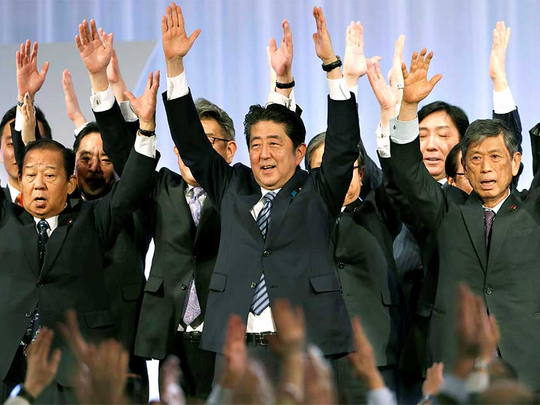
Tokyo: Shinzo Abe has a shot at becoming the longest-serving prime minister in Japan’s history.
Members of his ruling Liberal Democratic Party on Sunday rubber-stamped a rule change to allow party leaders to serve up to three consecutive three-year terms. The expected move during the party’s annual conference in Tokyo allows Abe, who came into power in late 2012, to potentially stretch his time in office through 2021. His first spell as prime minister ended after a year in 2007.
It’s possible that former LDP Secretary General Shigeru Ishiba may run for party leadership, but if the current political situation continues “it’s likely that Prime Minister Abe will be elected to a third term” during next year’s party elections, said independent political analyst Minoru Morita.
Abe, now the second-longest serving Group of Seven leader after Germany’s Angela Merkel, has brought stability at the top of Japan’s government after a series of revolving-door prime ministers. His domestic popularity has remained generally solid, with a Nikkei newspaper poll on Monday putting his support rate at 60 per cent. He’s been helped by a lack of rivals in the LDP and disarray in the main opposition Democratic Party, which has struggled to regroup after its 2012 election defeat.
“Abe’s support is not because of his policies, or that people are keen on him, but because it’s perceived there is no alternative,” said Jeff Kingston, director of Asian studies at Temple University’s Japan campus. “He’s going to last because there is no one to oust him.”
Kingston added that Abe wants the extra time to get the public on board with his drive to push through revisions to the constitution, specifically the war-renouncing Article 9.
As part of their 2017 policy, the LDP voted on Sunday to take “practical steps” toward proposing constitutional reform. Abe said the ruling party needs to lead the debate on revisions given their central role in postwar Japanese history.
Still, a scandal involving his wife and a nationalist kindergarten could damp enthusiasm for allowing him to stay in office four more years.
There are questions over how the educational foundation group that runs the Tsukamoto kindergarten in Osaka purchased state-owned land to build a new elementary school at what the opposition has said is a fraction of its assessed value. No evidence has emerged to tie Abe or his wife Akie — who had been set to act as the school’s honorary principal — with the land deal.
“This is the biggest political crisis he has faced, but I imagine the ‘Teflon’ prime minister will shake this off as he has in the past,” Kingston said. “There will be a little bleeding, and it could postpone any snap election, but it’s unlikely to derail Team Abe.”
Abe will overtake his mentor Junichiro Koizumi as the fifth-longest serving prime minister about three months from now. Taro Katsura currently holds the record, having served for a total of almost eight years in the early 20th century.
Abe led his party to convincing victories in a snap general election in 2014, as well as in two upper house polls.












